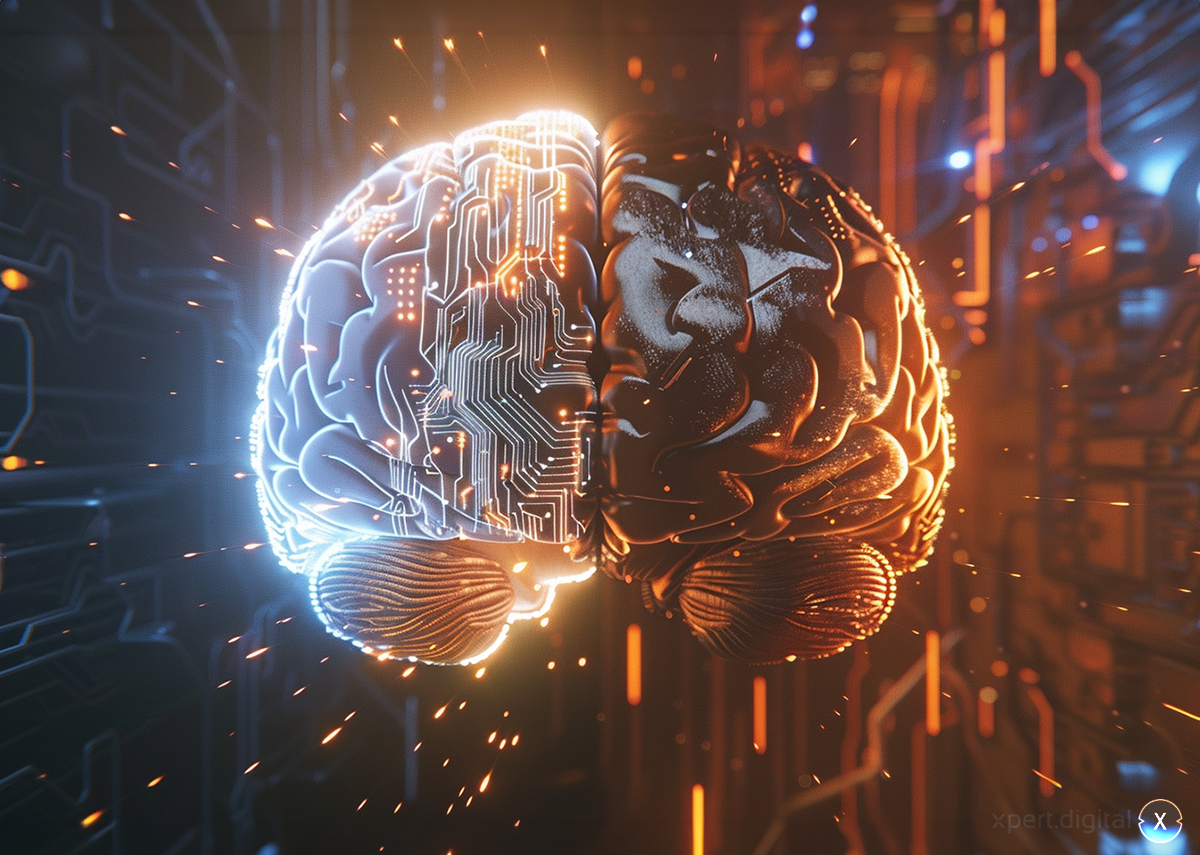
AI ecosystem or hybrid AI architecture – Why this is so important for companies – Image: Xpert.Digital
📈🤝 AI technologies in companies: ways to increase efficiency and competitiveness
🌐🤖 Companies around the world: How AI technologies are evolving the business world
Companies around the world are faced with the question of how to best integrate AI technologies into their business processes to increase both efficiency and competitiveness. Two of the most frequently discussed approaches in this context are the development of a comprehensive AI ecosystem and the implementation of a hybrid AI architecture. But what exactly are these terms and why are they so important for companies?
🤔 What is an AI ecosystem?
An AI ecosystem refers to an environment in which various AI technologies and applications work together to create a holistic solution. In such a system there are typically a variety of actors and components, such as: B. AI algorithms, data sources, analysis tools and user interfaces, all connected together. The goal of an AI ecosystem is to create an integrated system that is capable of processing data in real time, providing insights and presenting options for action.
An effective AI ecosystem offers numerous benefits to companies. For example, it enables flexible adaptation to changing market conditions and provides a basis for continuous innovation. Companies can access and seamlessly combine different AI applications, accelerating the development of new products and services. A well-built AI ecosystem also promotes collaboration between different departments and teams, which can further increase efficiency and quality of work.
💡 What is meant by hybrid AI architecture?
Hybrid AI architecture is another approach that is gaining popularity. This involves combining different AI technologies and models to make optimal use of the strengths of each individual model. For example, a company can combine machine learning (ML) with rule-based systems or neural networks. The advantage of a hybrid architecture lies in its flexibility and adaptability. It enables companies to specifically address specific challenges by using the right technology for the problem at hand.
Another feature of hybrid AI architecture is its ability to operate both in the cloud and on-premise. This is particularly important for companies that need to be sensitive to their data and prefer to store certain information locally rather than transfer it to a public cloud. This flexibility makes hybrid architectures particularly attractive for industries such as healthcare, finance or manufacturing, where data security is of utmost importance.
📊 Why is choosing the right AI approach so important?
For companies, the choice between an AI ecosystem and a hybrid AI architecture can have far-reaching consequences. Both approaches offer unique advantages, but the decision depends heavily on individual business needs and existing IT infrastructure.
In an AI ecosystem, collaboration and networking are paramount. Companies that already have a mature digital infrastructure and rely heavily on innovation and collaboration tend to benefit more from this approach. An AI ecosystem offers the opportunity to react flexibly to new market requirements and implement innovation projects more quickly.
The hybrid AI architecture, on the other hand, is interesting for companies that want to solve specific problems with tailored AI solutions. It offers the possibility of combining different AI technologies and using both cloud and local resources. This is particularly relevant for companies that need to maintain high data security and data protection standards or are looking for a specific solution to a specific problem.
Suitable for:
🗄️ The role of data in AI strategy
Regardless of the choice between an AI ecosystem and a hybrid AI architecture, one thing remains clear: data is the backbone of any successful AI strategy. Without high-quality and comprehensive data sets, it is hardly possible to develop AI models that deliver reliable and valuable results. Companies need to ensure they have the means to collect, store and analyze their data. Modern data platforms and tools play an important role here, making it possible to process and manage large amounts of data efficiently.
Additionally, companies must consider the ethical and legal implications of data use. Data protection and data security are key issues that cannot be ignored when companies implement AI solutions. Violations of data protection guidelines can not only lead to high fines, but can also permanently damage the trust of customers and business partners.
Suitable for:
🚀 Challenges and future prospects
Despite the enormous potential that both an AI ecosystem and a hybrid AI architecture offer, companies face various challenges when implementing these technologies. One of the biggest hurdles is the shortage of skilled workers. The development and implementation of AI solutions requires highly specialized knowledge that only a few specialists possess. Companies must therefore invest in the training and further education of their employees or purchase external expertise in order to meet the requirements.
📈 Increased efficiency through AI ecosystems
In the future, the role of AI in companies will continue to increase. Technologies such as the Internet of Things (IoT) and 5G will further enhance the capabilities of AI ecosystems and hybrid architectures. Companies that rely on these technologies early on and continually develop their AI strategies will have a decisive competitive advantage in the long term.
Suitable for:
🔍 AI ecosystem and hybrid AI architecture
The decision between an AI ecosystem and a hybrid AI architecture is central to a company's success in today's digitalized world. Both approaches offer unique advantages, and the choice depends on specific needs and business strategy. However, it is crucial that companies rely on AI at an early stage and create the necessary conditions to successfully implement these technologies. This is the only way they can fully exploit the opportunities offered by digital transformation and secure their competitiveness in the long term.
📣 Similar topics
- 📊 AI technologies in the corporate environment
- 🌐 Developing a comprehensive AI ecosystem
- 🧠 Hybrid architecture: The new AI strategy
- 💡 How companies benefit from AI
- 📈 Increased efficiency through AI ecosystems
- 🛠️ Implementation of a hybrid AI architecture
- 🔍 Data as the backbone of AI strategy
- ⚖️ Ethical and legal aspects of data use
- 🤖 Challenges in AI adoption
- 🚀 Future prospects for AI in companies
#️⃣ Hashtags: #AI #Business #Technology #Data Security #Efficiency
We are there for you - advice - planning - implementation - project management
☑️ SME support in strategy, consulting, planning and implementation
☑️ Creation or realignment of the digital strategy and digitalization
☑️ Expansion and optimization of international sales processes
☑️ Global & Digital B2B trading platforms
☑️ Pioneer Business Development
I would be happy to serve as your personal advisor.
You can contact me by filling out the contact form below or simply call me on +49 89 89 674 804 (Munich) .
I'm looking forward to our joint project.
Xpert.Digital - Konrad Wolfenstein
Xpert.Digital is a hub for industry with a focus on digitalization, mechanical engineering, logistics/intralogistics and photovoltaics.
With our 360° business development solution, we support well-known companies from new business to after sales.
Market intelligence, smarketing, marketing automation, content development, PR, mail campaigns, personalized social media and lead nurturing are part of our digital tools.
You can find out more at: www.xpert.digital - www.xpert.solar - www.xpert.plus

